#edmund mortimer
Text
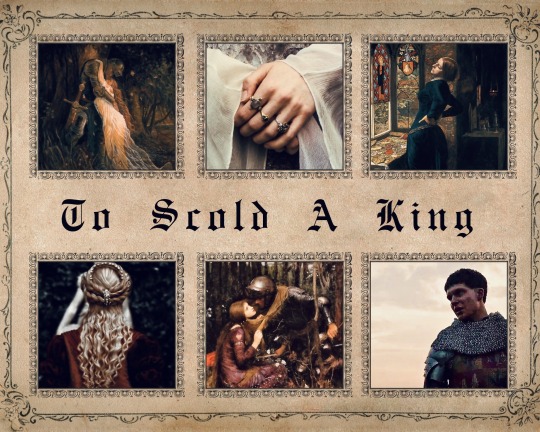
Twenty Songs Challenge, written after being so lovingly inducted by the powerhouse that is sweet Mey, @the-ugly-swan . Challenge being to choose twenty favorited songs and write one shots based off of them with any pairing or fandom of my choosing. Being a weirdo and a little burned out in my own created universes beyond the fics already in works, I chose what currently inspired me most, obscure as it is.
Pairing: Henry “Hotspur” Percy and Lady “Kate” Mortimer Percy -early 15th century
Fandom: RPF, Shakespeare? Tom Glynn-Carney’s 5 magnificent minutes of a performance as Hotspur in <The King 2019> the armor alone was amply inspiring. The Hollow Crown fans feel free to imagine whoever, as you like. I love this historical pairing in about any iteration and the plot is drawn from both Shakespeare’s play and real history, the timeline, plot and politics being pretty self explanatory through the incorporated dialogue. NOTE- wordplay ahead with “cur” and “Kerr”, the latter being a Scottish clan holding great enmity with the Percy Family and charged with holding the Scottish side of the border. Also I kept Lady Percy’s name as “Kate” even though it was technically Elizabeth in the records.
Dynamic: a rough northern lord and his too good for him lady -a lady who has, through years of an arranged marriage gone horribly well, come to find his homespun gallantry and blunt ways more than a little intoxicating when knelt before her in amused deference. She could almost find it in herself to be gentle with him -if he hadn’t just started a rebellion whilst away from her at the Capitol.
Dedicated to my wifey @prompted-wordsmith who I did proselytize into the Percy cult one fevered evening with inestimable results, including her contribution of a few choice lines herein.
🕯As it Was ~ Hozier
“There is a roadway, muddy and foxgloved
Never I'd had life enough
My heart is screaming out
And in a few days I would be there, love
Whatever here that's left of me is yours just as it was”
Warnings: 18+ to be safe. a small amount of sexual content, flirtations, a husband and wife touching in public, verbal sparring and talk of making children and use of the word “bred”, swearing, use of the words “cock” and “cunt.”

The sound of hooves in the courtyard rouses Kate from her anxious stupor by the hearth, toilsome grain list forgotten on her lap. The scroll swishes to the floor at her abrupt standing, wafting out of her path as she rushes to the window.
First the clatter of a single, foremost, over-eager rider, followed at a lag by his retinue, skilled riders all and armored as befits the guard of a nobleman. They make such a clatter in the yard when they come in after him. Some petty part of her briefly considers the tactic of staying here in their chambers in protest, a quiet sign of disapproval with his errand, of discontent with his brusque leave taking two weeks agone.
Her Harry would find her anyway, and like it better that she were in their chambers. He would like it well she were so near the bed and like it ill she slighted him in her dutiful welcome -but he would not speak of that. Not one for speaking much, her husband, not on matters that plague her these days, weeks, months. Kate might have it out with him in the old way and slap him about and toss cold quips and get from him little more than the same benign aggravation and good humored laughs between, a couple dozen kisses to her neck and a grapple in the sheets.
That is what talk they would undertake were she to stay up here.
It is that lone, eager, forerunning clatter of his horse that speaks to her, speaks for him. Just as his sword and his reputation and his gruff graciousness has spoken well of him across these northern lands, his eagerness to return to her, to outstrip his men in haste to be back from his fool’s errand and into her embrace -it is all the declaration of devotion she may expect from him. It is the truest form, without jape lacing his tone or tonic of lust clouding his confessions.
Harry Hotspur, as fast to return to his wife as he is to meet a fight.
It is love, of the sort she has grown to be grateful for, and it is that and fear of losing it besides, that rushes her out from their chambers and down the polished steps, out to the great hall and past the giant outer doors, cursing a lousy servant or five and ordering a bath and commissioning supper and refreshments as she goes. The torch flames bend from her flight, a whoosh and a shadow stalking Alnwick Castle’s stone passageways until the gray light of evening pours into her sight from the opened great doors. Squires and stable boys clutter her path but they part as she dashes, nay, only a dignified hasten now, out into the courtyard where nearly all of this fool’s troup have dismounted.
There are doffed helms to the Lady Percy, the jangle of chain mail crinkling with bows and scraps of deference all around them, but she sees only him, with mist dripping on his nose and a face too boyish for the insolence he has returned from discharging.
“Kate.” he utters.
Will ever he say her name lazily? She hopes not, for that alone she will endure the unwarranted cheerfulness with which he greets her on this dire occasion. She has heard it said in anger, in jest and in passion, vows and quips, praise and warning. And now in cheerful pleasure as evening mist soaks her gown and the heavy clunk of her husband's footsteps clang ever near her on the paving stones.
“Lord husband.” she greets, hands folded over her freshly healed womb.
His stride falters and he rocks back on his spurred heels, an arms length away, an embrace so tangible she can see his jaw tick from the watering of his mouth. “Lord husband is it?” he repeats thoughtfully, eyes drifting down to the paving stones for a brief moment as if to recollect some forgotten crime, they flick up soon and in them is jesting scrutiny, “My lady wife rushed all this way, down five corridors and a furlong of Keep only to greet me thus?”
Did her rising breath betray her eagerness? Could he see her in the hall despite his business dismounting?
“Your cheeks are red.” he shows her mercy, some form of it. His form. “But -Lord husband, it is, nevertheless?”
“Unless you would prefer ought else?” she inquires, he had once thought this smile quite chilling, he had admitted after their first babe, now he finds it rousing, he has admitted after their third.
“If it please you.” his shifting stance is noisy, his tabard and sword and still clutched helm a racket of accouterments in the pattering rain.
“I have any number to offer,” she concedes, stepping nearer, a lady’s step, covering one third of the ground between them that he might vanquish in a single stride. Still, he waits. “Knucklehead.” she whispers, her breath a fog and her insult as lost as vapor in the ears of his watching men, her bearing alone must satisfy their curiosity, as must his growing smirk and rising color, “Jackenape.” Another step until each little scar on his face is visible and the little canyons each raindrop make of them. She saw his finger twitching where it grasped his visor “Cur.”
There was the slightest flinch between his brows at that, a furrow that smoothed as his mirthful lips flattened out. “Careful now, lady wife, with words like Kerr* thrown about, my men might think you presumptuous, their lady gone and married to some other, a Scottish laird at that. So sure of my death already, sweet Kate, that you must speak of Kerrs in mine own yard? Ha, ‘pon my word you are qu-“
“Hush!” Her hand, fresh warmed as it was by recent hearthside and rich velvets pressed frimly to his lips, a tingle shooting straight to her toes at touching him at last. He was silent then, only the puff of breath against her fast chilling fingertips. “Tease me not so,” she begged, her own mirth gone out in her eyes, her arch look turned to grief, “not when you are just returned from an errand all but ensuring such an end. It is too cruel, even of you. Handle me kindly, Percy, as you always have, in words this time, if not in embrace.”
He seemed to ponder this before raising that hand not occupied with his helm, clumsy and clad in gauntlet as it was, to her wrist, wrapping the chilled and layered steel round her pale flesh and gently tugging her hand from his lips, only so far as to press it to his cheek instead, their audience of men at arms unheeded. “I betook myself to London,” he enunciated, as if it were their first night all over again and his thick borderland drawl too strong for her courtly ears to decipher, “to remind a king of his debts.”
“And tell me!” she cried fiercely, a choked, barely quieted protest as her hands dug into the wet leather of his jerkin, wrist twisted from the steel grasp, “What errand is that but a fool’s? Have you no fear at all left in this bruised carcass? Do I patch up an animated corpse time and again from your wars only for it never to have soul and feeling and wisdom in it? Do I, Harry? Gone to remind a king? How do you dare such?”
“It is he who has dared too much!” he cried back, loudly where her’s had been choked, a ringing and rebauld defense, worthy of a man who would chastise his monarch in full view of council. “First his debts, and now my son’s land! We did not make children so as to watch like blithe cowards as their birthright is bequeathed out from under our feet -piecemeal!- to a courtly cunt whose only recommendation is his alacrity to pucker and bow.”
Kate glanced about her at the men making show of industry, piddling at harnesses and armaments, walking horses in circles. Her husband's words could be no worse than what he had said to the King’s own face, anyone without stomach to become a rebel would have stayed behind in the Capitol, sensing dissension brewing. Lady Percy could perceive none missing from his number. So, a war it was to be, then.
“So, a new generation of Percys is to play at kingmaking.” she summarized.
“We make no boast of it.” Harry protested in turn.
“No,” said she, “why would you with how poorly your last choice has served you?”
That caused a start from him, a step forward that was neither gallant nor eager but angry as man to man. Kate, still with hands fisted in the crooks of his armor, stepped with him, backwards to his hall. “It is your brother with the better claim.” he showed his plan at last, a slow and conniving admission, one not common for his brash ways and straightforward mind.
Kate gasped at the implication. “Edmund?”
“He was proper heir, all along.”
“Your father-“ she chose her wording carefully, “-did not agree.”
“My father’s preference is not law.”
“It is mistaken for such, often.” Kate smirked in reply. “And Edmund is not suited-“
“-Edmund is not the turd now stealing from his vassals!” her Harry rejoined, his helmet pressed to her chest, “Edmund will do.” he reiterated once more.
Kate stared at his temper, the signs of it in his flaring nose and his wild eyes, the cure was between her thighs but watching mist drops fall from unblinking lashes was sweet prelude indeed. “Edmund,” she replied quietly and in a manner to be heeded, “is not willing or suited, he prefers instead to listen to welsh bards and lay upon the lap of his savage wife.”
Her Harry rolled his eyes at her truth, an admission, or the closest to one, she would ever receive. As if battling some great inner turmoil she watched him purse his lips and heave out a sigh before in a sudden movement the helm was tossed to the ground -much to the scramble and reaction of a half a dozen squires who ran to pick it up from its puddle- and suddenly steel hands were upon her hips, tugging her near to him even as she shied away, her face turned in a pantomime of demureness. “Strange,” he said and his tone suggested he still pondered her report of her brother's amorous preoccupations, “-and her lap so less Devine than mine own wife’s.”
“Then why do you haste from it so often?” she whined, delivering a smack against his belted tabard, right where the lions paraded across his right breast.
“Only a man dying of thirst appreciates that water has a flavor.” he reasoned and Kate allowed the open mouthed kisses that crept down her neck, her face turned stubbornly still to the south wall. The blacksmith's roof will be in need of new thatching soon, before spring. Before war.
She feels stubble against her tender skin, bracketing those pretty lips she once derided him for. No warrior ought to have lips like that, it was not seemly, not when maidens were denied such richness, such fullness, such rosy hue. But there is roughness about his lips and on his jaw as it tucks into the juncture at her shoulder, that show of clavicle her dress allows drawing him in like a siren’s song. He must’ve rode hard the entire way, no inns or refreshment, no shaving or baths, straight to her as from a battlefield. The King’s city is just as loathsome as any field of carnage, but he went to free her brother, to get a ransom, to reclaim their stolen land, to remind a king.
He did it for her, and the babes she gave him.
Kate turns her face from the blacksmith's thatch and raises her hand to his face, tenderly stroking the three days' beard that's grown as he's been on the road, riding hard to get to her. They have backed nearly to the hall’s mouth, the drip of rain off the gutter patters behind her on the threshold, Kate knows he can smell supper and hear the clatter of their children racing to meet him on still chubby legs. How different is the love of home, man to woman, Harry would sooner fight for it and she would cower within. Her thumb swipes at the raindrops making farce of tears upon his cheek.
"Princess," he breathes against her palm as he crushes her into his chest, still half armored and agonized for it as he cannot feel her softness with the cuirass, the leather, the chainmail. There are curves and bosoms and soft flesh he knows too well just on the other side of this awful barrier.
Princess will be her title if his treason succeeds, if her brother wears that cursed crown. “Princess”. It sours her mouth, but it is kind of him to wish it for her.
"You will come back, Harry.” she commands of him, she declares the outcome of this brewing war, “Soaked in the blood of feckless scum, you will come back and put another babe in me. A little prince or princess," she hisses in his ear, and she can tell he freezes at that, her concession to his treason, still as stone in his metal casings.
His eyes are ever so blue as they search hers.
"So I forbid any recklessness, my Lord Husband. Because I want this - " and her hand slips beneath his jerkin and the hem of mail to squeeze his cockstand most assuredly, as assuredly as she was that he would be sporting one for her, gripping it as one might grasp a chalice of wine during a toast "- and the rest of you, in one piece." Harry slumps against her shoulder, panting into the chilled hair and too heavy for her little frame. "Or so help me God." she intones, sharper than any steel he wields. "Swear it, Harry." She gives him another punishing squeeze, and he groans, agonized, as his mouth meets with the softness of her bound bosom, his knees the hardness of the stone cobbles. If she hadn't promised a use for his cock, he'd think she was liable to geld him herself at his presumption to seat and unseat a king, but now that he is out of her grip, for a moment, and looks up at her with such longing he fears his soul has left his chest for hers.
"So help me God." he agrees, it is in providence’s hands, after all, and in Kate’s clasped one’s atop his head.
“Fool.” she says once more as she bends over him, gently pressing a hand to the back of his head, pressing his face to her belly and her chilled fingers to his sopping hair, “It is not my brother these men fight for, nor for me. Not when it is you that calls them to it.”
“For what then?” He mumbles into her womb, hands heavy on her hips, the courtyard’s occupants dispersed into the shadows of the eaves, but a couple dozen peering eyes twinkle towards them in the twilight’s gloom.
“How often have I heard it said here, in this very courtyard.” Kate scoffs, observing the strength knelt so adoringly before her, “Have I dreamed each cry of ‘no prince save he be a Percy?’ Ha, to think they fight for a Mortimer, indeed. Ha!”
Harry staggers to his feet at this poke, it is, as are so many of his Kate’s wounds, half torment, half praise. His blood pounds with the elixir of her acknowledgment of his capability. “It is well then, Kate Mortimer,” he recites, daring now to put his lips very near her own, to nuzzle his strong nose with her hawkish one, to tip a chin and bat an eyelash against her wet cheek, “it is well that you are Percy now yourself, through and through, wed-“ his lips meet hers in a brush she chases after, “-and bred.”
🕯🕯🕯🕯🕯🕯🕯🕯🕯🕯🕯🕯🕯🕯🕯
Hope all five of you who read that enjoyed it. 😆 I know it’s a fragment but as I’m nothing but hyper fixated when some interests resurrects in me, I’ll probably be back with more of them. Drop a note below if you’d like to be on a taglist for such developments.
#rpf#Shakespeare fanfiction#Shakespeare characters#but also#the middle ages#medieval#medieval history#the hollow crown#Kate Percy#Kate Mortimer#edmund mortimer#Henry Hotspur Percy#Harry Hotspur Percy#war of the roses#henry percy#Richard ii#gonna go ahead and tag this as#tom glynn carney#as he was faceclaim#the king 2019#Tom Glynn Carney Fanfiction#aegon ii targaryen#aegon targaryen x reader#northumbria#joe armstrong#michelle dockery#period drama
39 notes
·
View notes
Photo
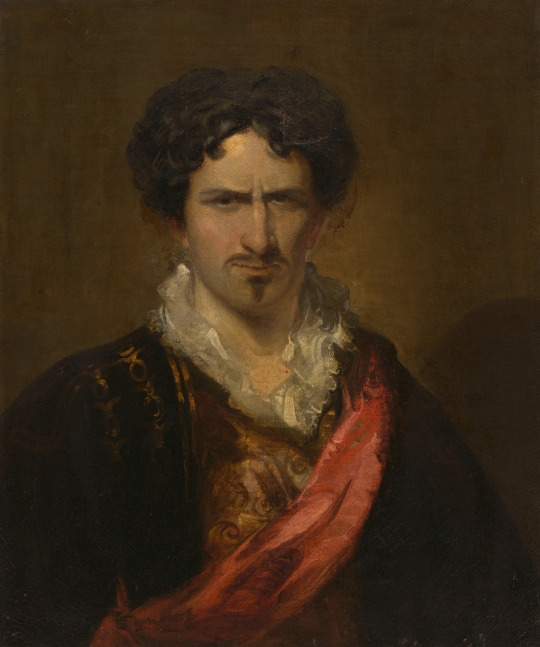
The actor Junius Brutus Booth in costume as Edmund Mortimer in Shakespeare’s Henry IV, Part 1 (1823), painted by John B. Neagle
#shakespeare#the henriad#art#this was john wilkes booth's father.................. so for that reason i will not be tagging the actor by name lol#idk WHAT kind of weirdos i would invite to my blog by doing that but for historical transparency i did cite the actor#listen. i. he died in 1852 i bet he sucked as a person but he didn't assassinate anybody okay#the portrait is bitchin and i found it while looking up#henry iv part 1#i henry iv#william shakespeare#edmund mortimer#john b. neagle#i wish there were more resources to learn about the lady mortimer#i also wish she had more actual dialogue in the play i find her so interesting#i wonder what elizabethan performances were like of her!!! bc all of her dialogue is just [speaks in welsh] or [sings in welsh]#it makes it so hard to imagine her as a reader. normally i like the abstract exercise of envisioning plays in my head but#wo her own words it's so much less of an approachable challenge#i don't even speak welsh too#and i wonder what the history of her being represented on stage is like#did they normally have an actual welsh actor/actress play her? i sort of DOUBT it was originally like that in the 1590s#but im sure if it's a high-budget production done today it's only natural to seek out a welsh-speaking actress and have her collaborate#w her own dialogue? right?#it's so surreal too bc shakespeare's works almost never acknowledge differences in language#it rarely has much to do w the plot#the only other passing reference i can think of off the top of my head is 'twas greek to me' and that was offstage someone spoke greek#in julius caesar#idk!!!! man!!!!! i just find it interesting#most of shakespeare's characters wouldn't have even natively spoken english so it's just never mentioned#but in the history plays. well of course they spoke english they were englishmen! except those celtic ppls#who always come up as just. iconic charismatic bastards and rebels. it's a very prejudicial interpretation but i have fun w it
58 notes
·
View notes
Text
Gentle guardians of my decaying age. May the dying Mortimer rest in peace. Even a man who faced doom here are my limbs long imprisoned let these gray locks the followers of death hear the end of Edmund Mortimer.
William Shakespeare, Henrique VI, Parte I
2 notes
·
View notes
Text

Bad movie I have The Devil Bat 1940
#The Devil Bat#Bela Lugosi#Suzanne Kaaren#Dave O'Brien#Guy Usher#Yolande Donlan#Donald Kerr#Edmund Mortimer#Gene O'Donnell#Alan Baldwin#John Ellis#Arthur Q. Bryan#Hal Price#John Davidson#Billy Griffith#Wally Rairden
3 notes
·
View notes
Photo

Films Watched in 2022:
103. The Devil Bat (1940) - Dir. Jean Yarbrough
#The Devil Bat#Jean Yarbrough#Bela Lugosi#Suzanne Kaaren#Dave O'Brien#Guy Usher#Yolande Donlan#Donald Kerr#Edmund Mortimer#Films Watched in 2022#My Post
3 notes
·
View notes
Text
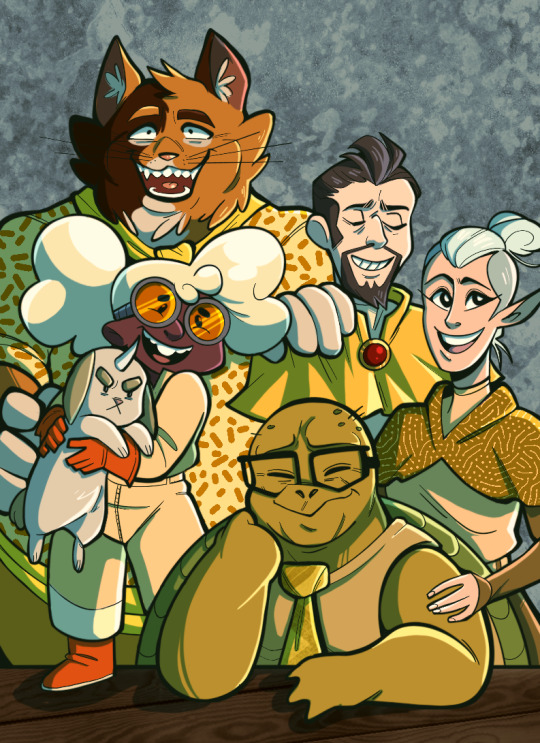
It's Always Sunny in Team Null.
#Original: DNDorks#Campaign: Team Null#Char: Hexis Ronklebottom#Char: Oyster#Char: Edmund MacHalfred#Char: Lux#Char: Mortimer Meatloaf Montgomery
6 notes
·
View notes
Text
A VISIT TO KING'S LANGLEY
King’s Langley was once home to a massive Plantagenet palace, built out of the remnants of a hunting lodge of Henry III for Edward I’s Queen, Eleanor of Castile. She furnished it lavishly, with carpets and baths. There were shields decorating the hall and a painted picture of four knights going to a tournament, while the expansive gardens were planted with vines. After her death, the palace was…
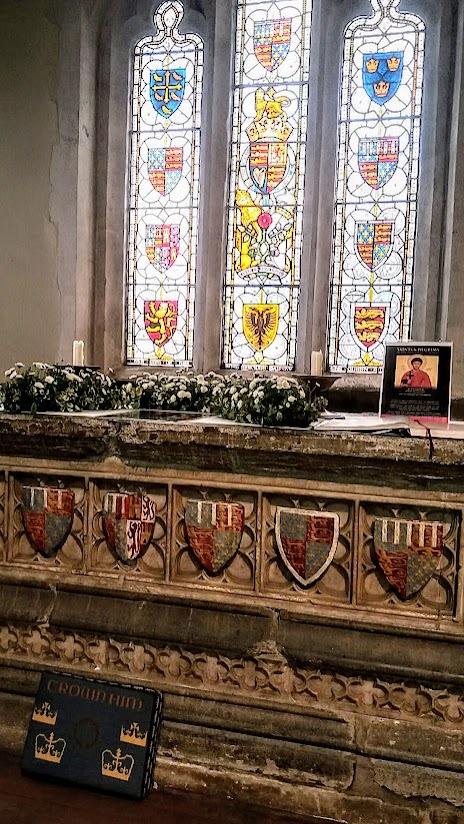
View On WordPress
#Anne Mortimer#camels#Cecily Neville#Christmas#Clarendon Palace#clocks#Dominican friaries#Edmund of Langley#Edward II#Edward III#Eleanor of Castile#fire#Henry III#Henry IV#Isabel of Castile#Joan of Navarre#John of Wheathampstead#King&039;s Langley#palaces#Piers Gaveston#Reformation#Richard Earl of Cambridge#Richard II#royal tombs
10 notes
·
View notes
Text
I love it when historians go "we need to take this relationship as seriously as this other relationship" before seguing into how the other relationship is totally fake and made up and perpetuated by hack historians.
#ricardians demanding that eleanor talbot and edward iv was real and not a cynical claim by a usurping king...#then saying it should 'at least' be taken as seriously as catherine de valois and owen tudor#and then turning around and arguing that catherine's 'tudor' children were actually fathered by edmund beaufort#a certain edward ii historian making this argument for edward ii and piers gaveston compared to isabella of france and roger mortimer#and then claiming that unlike catherine de valois (apparently)#isabella had too much sense of her royal dignity to fuck roger mortimer who after all wasn't a king like edward ii#(and no i'm not pulling the 'unlike catherine de valois' thing from my arse)#(this historian literally goes 'isabella had too much royal dignity to fuck mortimer#do not cite catherine de valois to me she's an entirely different person')#(fair but it also seems like she's saying a queen would only fuck a non-royal if she didn't have a sense of royal dignity right?)#text posts
4 notes
·
View notes
Text
6 luglio … ricordiamo …
6 luglio … ricordiamo …
#semprevivineiricordi #nomidaricordare #personaggiimportanti #perfettamentechic
2022: Houston Stevenson, attore canadese, conosciuto soprattutto per la partecipazione nei film Descendants 2 e Lei è la mia pazzia, dove interpretò il principale antagonista. Figlio di Ronnie Stevenson. Scopre il suo amore per la recitazione in età molto precoce, e già a dieci anni lavora nella produzione di pellicole cinematografiche. Successivamente, studia e si diploma alla Shawnigan Lake…

View On WordPress
#6 luglio#6 luglio morti#Babe Paley#Barbara Cushing Mortimer Paley#Cameron Boyce#Cameron Mica Boyce#Cameron Mitchell#Dave Legeno#David Legeno#Delos Thorson#Ennio Morricone#Gail Patrick#Harry A. Pollard#Houston Stevenson#James Caan#James Edmund Caan#Jeanne Lanvin#Jeanne-Marie Lanvin#Jerome Charles Weintraub#Jerry Weintraub#Joe E. Brown#Joseph Evans Brown#Leonard Franklin Slye#Marcello Prando#Margaret LaVelle Fitzpatrick#Roy Rogers#Russ Thorsen#Russ Thorson#Russel Thorson#Russell Thorsen
1 note
·
View note
Text
Book Review - ‘Wars of the Roses: The People, Places and Battlefields of the Yorkists and Lancastrians’ by Paul Kendall
Thank you to Pen and Sword for gifting me a copy of this to review.
What I do like about Paul Kendall’s books is that his books seem to each have 100 sections, whether it’s people, places, or objects. There isn’t just an image plate section in the middle, but the images are dispersed throughout the book. It gives a lovely text/image balance that you don’t always get with history books. I love…

View On WordPress
#Anne Neville#Barnet#Battle#Book#Book Review#Bosworth#edgecote#edmund earl of rutland#Edward IV#Edward V#Elizabeth of York#Elizabeth Woodville#gifted#Henry VI#Henry VII#Lancastrian#lancastrians#losecote field#Margaret of Anjou#mortimer&039;s cross#Northampton#Paul Kendall#Pen and Sword#Princes in the Tower#Review#Richard Duke of York#Richard III#St Albans#Tewkesbury#Wakefield
1 note
·
View note
Text
I occasionally see Henry IV's treatment of the Mortimer boys as "proof" Richard III had no need to kill the Princes in the Tower and it always strikes me as a false equivalency.
Henry IV had very good reasons to keep the Mortimer boys alive. The Mortimer claim to the throne would not be extinguished by their deaths nor transfer to him, but would devolve upon their Mortimer relatives. Their sister, Anne's claim was eventually used by Richard Duke of York and Edward IV as justification for the Yorkist usurpation of the throne. More relevant to Henry IV's lifetime, however, was the boys' uncle, Sir Edmund Mortimer, whose loyalties appear to have concerned Henry even before he became an ally of the Welsh rebel Owain Glyn Dŵr. The Glyn Dŵr-Mortimer alliance posed a clear risk to Henry, one that would be only worsened should the Mortimer boys have died. Mortimer was out of Henry's reach, unable to be swiftly or easily dealt with. Another interesting facet was Mortimer naming his son after Lionel of Antwerp, from whom the Mortimers derived their claim to the throne. In short, Mortimer was an opponent in open rebellion against Henry, showed clear interest in championing his family's claim to the throne and was also unable to be quickly or efficiently dealt with. Killing the Mortimer boys would have only produced a much greater threat to Henry IV's reign.
Nor was the risk limited to Edmund Mortimer. The Mortimer claim derived through the female line which meant every girl and woman in the family could have passed on her claim to another family. Again, Anne Mortimer and the Yorkist claim is the obvious example but more pertinent to Henry IV was the claim passed from Elizabeth Mortimer (Sir Edmund's sister) to her son, Henry Percy. This Percy was still a child, like the Mortimer boys were, but he was also the son of Henry "Hotspur" Percy and grandson of Henry Percy, 1st Earl of Northumberland, both of whom rebelled against Henry IV. If Henry killed the Mortimer boys and Edmund Mortimer died (naturally or unnaturally), Percy would likely become the next figurehead for the next rebellion, serving as an alternate king. Like Edmund Mortimer, he was also out of Henry's reach, meaning there was no quick and easy way to deal with his claim.
In realpolitik terms, murdering the Mortimer boys would have only created problems for Henry. They were children in Henry's custody, raised side-by-side with Henry's own sons. Any threat they posed was, realistically, small. Their deaths would only allow much more dangerous opponents to inherit their claim and pose a much greater risk to Henry IV. Nor was it workable for Henry to wipe out the entire Mortimer line, including collateral branches, to eliminate the threat. Additionally, the destruction of the Mortimers likely would have backfired terribly on him. The murder of children was considered abhorrent by their society, regardless of any good realpolitik reasoning, and Henry's reputation was already poor. For Henry, the option that gave him the best security was the option he took - he left the Mortimer boys alive.
This is not true for the Princes in the Tower. Leaving aside the debates on their fate, their claim derived from the same source that Richard III's did. When they were declared illegitimate, their claim devolved on Richard. Their death would have only confirmed Richard's right to the throne, especially considering Richard was not interested in championing the claims of Edward IV's daughters or George Duke of Clarence's children.
I am not getting into the debate of whether Richard did/did not kill the Princes because I don't have the time or energy for that. What I am saying, though, is the argument that he may not have killed them because Henry IV didn't kill the Mortimer boys is disingenuous. It was in Henry's best interests to keep them alive because killing them only meant their claim would have passed to more dangerous claimants who had already rebelled against him or were the children of those who had already rebelled against him. Richard III, on the other hand, had no such issue. The Princes' claim posed a threat to him (if they were not a threat, why were they kept imprisoned after they were de-legitimised and why did they mysteriously disappear? Even if one accepts the theory that Richard sent them to the continent or the Princes had no quarrel with their benevolent uncle, he must have done so with great secrecy and for a reason - i.e. he feared that they would be used against him as figureheads for a rebellion). But with Clarence's children both removed from the succession by attainder and in his custody, the claim to the throne that the Princes possessed fell to him, not to any of his enemies. Indeed, the great threat to his reign was the revival of the Lancastrian claim in the form of the future Henry VII.
23 notes
·
View notes
Photo
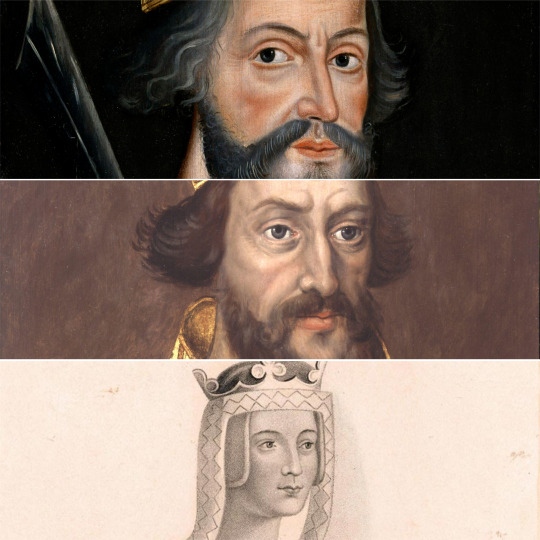
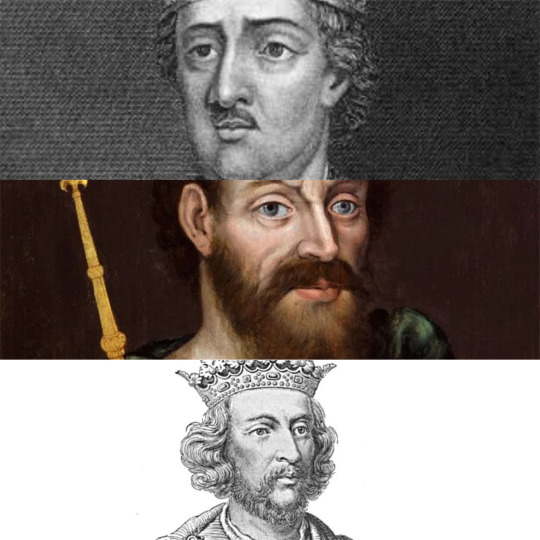

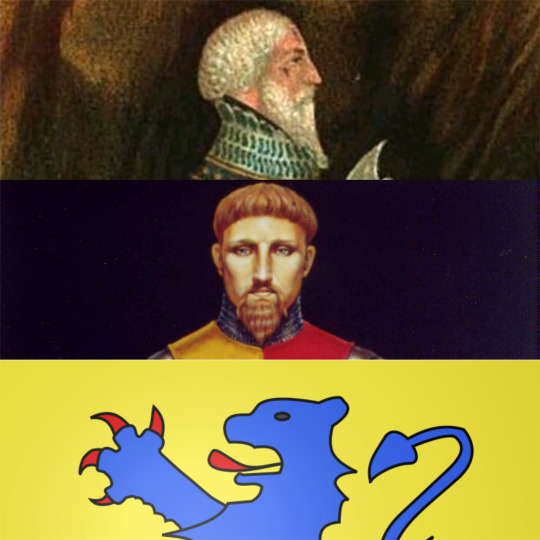


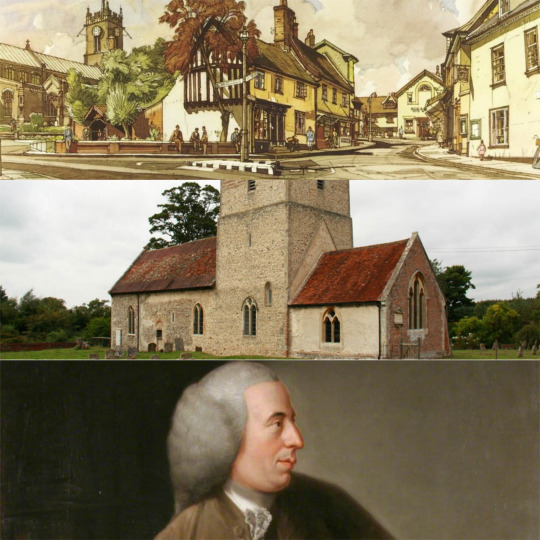
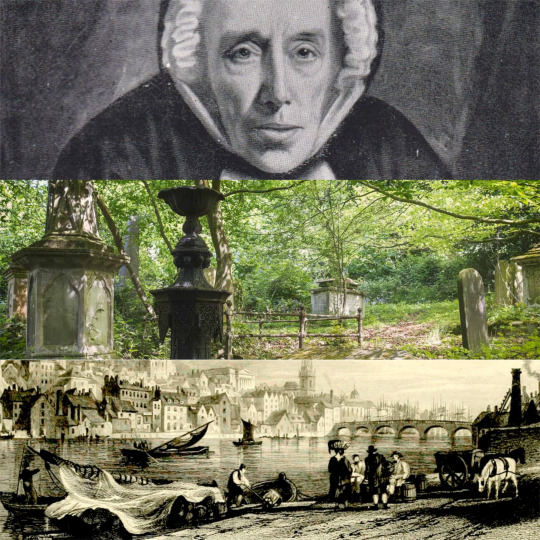
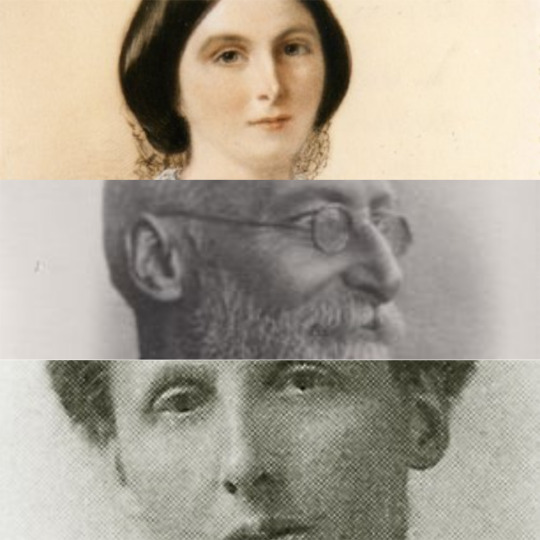

William, The Conqueror to Catherine, The Princess of Wales
⤜ The Princess of Wales is William I's 27th Great-Granddaughter via her paternal grandfather’s line.
William the Conqueror (m. Matilda of Flanders)
Henry I, King of England (m. Matilda of Scotland)
Empress Matilda (m. Geoffrey V, Count of Anjou)
Henry II, King of England (m. Eleanor of Aquitaine)
John I, King of England (m. Isabella of Angoulême)
Henry III, King of England (m. Eleanor of Provence)
Edmund, Earl of Lancaster (m. Blanche of Artois)
Henry, 3rd Earl of Leicester and Lancaster (m. Matilda de Chaworth)
Mary of Lancaster, Baroness Percy (m. Henry de Percy, 3rd Lord Percy) - Coat of Arms
Sir Henry Percy, 1st Earl of Northumberland (m. Margaret de Neville)
Sir Henry ‘Hotspur’ Percy (m. Elizabeth Mortimer)
Sir Henry Percy, 2nd Earl of Northumberland (m. Lady Eleanor Neville) - Coat of Arms
Sir Henry Percy, 3rd Earl of Northumberland (m. Eleanor, Baroness Poynings) - Coat of Arms
Lady Margaret Percy (m. Sir William Gascoigne)
Agnes Gascoigne (m. Sir Thomas Fairfax) - Gawthorpe Hall, family seat.
William Fairfax (m. Anne Baker) - Gilling Castle, family seat.
John Fairfax (m. Mary Birch) Master of the Great Hospital at Norwich, Norfolk
Rev. Benjamin Fairfax (m. Sarah Galliard), Preacher at Rumburgh, Suffolk.
Benjamin Fairfax (m. Bridget Stringer) died in Halesworth, Suffolk.
Sarah Fairfax (m. Rev. John Meadows) died in Ousedon, Suffolk.
Philip Meadows (m. Margaret Hall)
Sarah Meadows (m. Dr. David Martineau)
Thomas Martineau (m. Elizabeth Rankin) buried at Rosary Cemetery, Norwich.
Elizabeth Martineau (m. Dr. Thomas Michael Greenhow) died in Newcastle upon Tyne, Northumberland.
Frances Elizabeth Greenhow (m. Francis Lupton)
Francis Martineau Lupton (m. Harriet Albina Davis)
Olive Christina Lupton (m. Richard Noel Middleton)
Peter Francis Middleton (m. Valerie Glassborow)
Michael Francis Middleton (m. Carole Elizabeth Goldsmith)
The Princess of Wales m. The Prince of Wales
#this took wayyy to long#princess of wales#william the conqueror#history#ancestry#pictures#people#brf#british royal family#empress matilda#henry ii#henry i#john i#king of england#henry iii#hotspur#KTD
84 notes
·
View notes
Text
JACK CADE! JACK CADE! JACK CADE! JACK CADE!
#reblog to restore edmund mortimer to the throne my fellow kentish patriots#text post#2 henry vi#ii henry vi#henry vi part 2#wars of the roses#jack cade#shakespeare
2 notes
·
View notes
Text
#OTD in Irish History | 5 March:
In the liturgical calendar, today is the Feast day of St. Kieran, sometimes listed as ‘Kevin the elder’.
1389 – Thomas Mortimer is appointed Justiciar of Ireland. Mortimer was an English soldier and nobleman. He moved to Ireland as a deputy to his brother Edmund after he was made Lord of Ireland.
1716 – Martin Bladen, soldier, politician, civil servant, gambler and writer, is given leave in the…
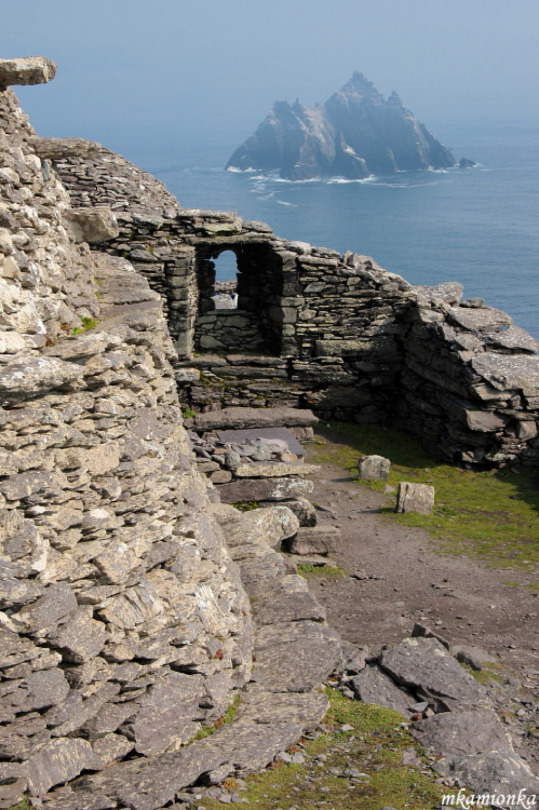
View On WordPress
#irelandinspires#irishhistory#OTD#5 March#Bobby Sands#Dermot Morgan#History#History of Ireland#Ireland#Irish Civil War#Irish History#Irish War of Independence#Jim McCann#The Dubliners#Today in Irish History
10 notes
·
View notes
Note
Hi! I love your posts and insights about the Wars of the Roses. Do you think you could talk a bit about Richard Duke of York? What do you think his character/life was like? Also re his and his sons appearance??
Hi! I'm sorry for taking so long to answer your ask, but I just couldn't find the time before. (I happen to currently have more free time than usual, due to particular circumstances.)
Thank you for asking about Richard, Duke of York, because I think he is a very interesting historical figure who gets usually overshadowed by his sons. If one day someone decides to make a new TV show or movie about the Wars of the Roses that doesn't just skip over the 1460s and start when Richard Duke of York, his life would make quite a compelling story.
As for historical books about him, I recommend Matthew Lewis' Richard, Duke of York: King by Right.(2016), which is a very detailed (but still very interesting, to me at least) account of his life. I read it a few years ago so I don't remember all the details, only the main points and overall impression I got from it.
My main impression is that, although he is often portrayed by pro-Lancaster writers as power-hungry, this is far from the truth. It seems unlikely that he ever wanted to challenge Henry VI and put himself forward as king, before the last year of his life - and this controversial act makes perfect sense when you look at the circumstances and the things that had happened to him and his family just before that. Besides, while Richard was for a long time - before Edward of Lancaster was born - Henry VI's heir, it seems more likely that he was hoping that his son would one day succeed Henry, rather than himself, since Henry was younger than him and in good physical health. Rather than the result of some evil overreaching lust for power, it seems to me that his conflict with the Lancaster/Beaufort faction was a result of the years of frustration over his treatment. As the conflict grew, staking his clai to the throne throne may have been an act of desperation (since, at that point, this must have seemed like the only way to protect himself and his family), but maybe he was also just really done with everything, and with Henry VI and unwilling to support him as King. Considering the context, I don't really think even pro-Henry VI people could really blame him.
But first I think we'd have to go back to the beginnings. I think that Richard's childhood and, most of all, what happened to his father, is what framed his whole life. Richard's mother, Anne Mortimer (great-granddaughter of Lionel, Duke of Clarence, the second of the sons of king Edward III who survived childhood), died soon after giving birth to him, aged only 22. His father, Richard, Earl of Cambridge (himself the grandson of Edward III through his 4th surviving son Edmund, the Duke of York), was executed - when Richard wasn't even 4 years old - for his involvement in the Southampton Plot to depose Henry V in favor of his brother-in-law, Edmund Mortimer (but since Edmund had no children, really in favor of his own son Richard, who would be his heir).
After all, the Lancasters, i.e., Henry V's father Henry IV , himself the son of Edward III's third son John of Gaunt, Duke of Lancaster, had deposed Richard II, skipping over the line of the elder son Lionel, so it could have been reasonably argued that the Mortimers's claim to the throne was stronger (sure, it was through the female line - but so was the English royals' claim to the throne of France - France had installed the Salic Law to bar the female lines from the throne of France - really to bar the English kings from it, but England did not). But Henry V was a crowned and annointed king, so trying to depose him would have been treason... (Even though he was only on the throne because his father had deposed, imprisoned and starved to death another annointed king. To quote one of my favorite TV shows, "Treason, like beauty, is in the eye of the beholder". But it's crucial whether you won or lost.)
Just a couple of months later, his uncle Edward, his father's elder brother, was killed without children, Richard became the heir to his lands and titles and became the Duke of York at the age of 4. Ten years later, after the death of his maternal uncle Edmund, he also became heir to the Mortimer estates.
So, young Richard grew up as an orphan but also one of the technically most powerful and richest people in England, and heir not just to titles and lands but also the claims to the throne from not just the 4th but also the 2nd son of Edward III (the latter being the senior line of succession after the deposition and death of Richard II) to rival the Lancaster dynasty. And at the same time, he lived in the shadow of the fact that his father had died as a traitor and rebel against the crown for pressing that same claim.
If I were to speculate about Richard's personality and how his upbringing shaped it, I think he was a person who tried hard to do everything right, to fulfil his duties in every way and be beyond reproach, exactly because he had so much responsibility and probably so much to prove. Something that really strikes me about Richard is that he seemed almost too perfect: competent, respected nobleman popular with the people, in a stable marriage, not known to have any mistresses or sexual transgressions, had seven children who suvvived childhood including four sons...What the contrast to Henry VI, a nice and pious man but notoriously disinterested in ruling (long before he started showing signs of mental ilness and became catatonic), prone to relying on favorites such as his extremely incompetent cousin Edmund Beaufort. and also, for a long time, unable to conceive a child with his wife Margaret of Anjou (and possibly uninterested in trying), before finally siring Edward.
And this is exactly why Richard must have come across both as such a threat in the eyes of Queen Margaret, Edmund Beaufort and other people around Henry VI. How could they not be wary of his powerful man, Henry's cousin and heir, who had all the qualities you'd want in a king, which Henry lacked? However, if he was really power hungry and eager to replace Henry as king, he certainly didn't show that for many years. I think he must have been especially eager to prove his loyalty with the "son of the traitor" thing hanging over his head since he was a child. But he was nevertheless constantly under suspicion and distrusted by the Queen and her faction. I remember reading the details of his career, which come across as Richard constantly having to prove himself while being denied positions or sent away - his appointment in Ireland was really meant a virtual exile, to get him away from court (but it resulted in him and by extension the York dynasty gaining long-term popularity and stronghold in Ireland). (One of the common myths is that Richard was warlike and that this got him in conflict with the supposedly more peaceful faction - in fact, if I remember correctly, it was Edmund Beaufort who acted belligerent in France but made a mess of things, which Richard then had to clean up.)
It all must have been really frustrating to Richard - he was doing everything right, but it was never enough, and he had to prove his loyalty over and over. Maybe the Queen and the Lancastrians really created a self-fulfilling prophecy. Theoretically, I suppose Richard could have been binding his time and playing some really long con to depose Henry, but that seems unlikely looking at the details.
Instead, I think the most likely reason for his decision to start claiming the throne for himself in 1460 is that the conflict had become too harsh and the situation too desperate after he had been proclaimed a traitor to the crown and had to flee to Ireland. The attainder meant he was to be killed if he set foot in England again, and his family was disinherited. He had to successfully invade (ironically, he was in a similar situation that the future Henry IV before he deposed Richard II) and then either make himself Lord Protector again or even Henry's heir, or to proclaim himself the true king.
But I thin the earlier loss at the castle of Ludlow, when the Yorkist troops were reluctant to fight the Lancastrian army when Henry VI himself was at its head (a puppet or not, ineffectual or disinterested, the annointed king was seen in an almost religious light and had enormous symbolic authority), and then the brutal sack of the castle, where Richard's wife Cecily Neville, his daughter Margaret and his two youngest children George and Richard (who was only 7) at the very least had to witness awful scenes of rape and pillage, by that same army with Henry as its nominal head... this may have been the straw that broke the camel's back and made Richard decide he was done with Henry VI. (Whether or not he had earlier really respected Henry or just respected his position as King.) And I really can't blame him.
I wonder how he felt when he finally made that decision, which would lead to his death less than a year later - followed by his eldest son's successful campaign and decisive victory over the Lancasters? Was it sheer desperation and survival, was he angry, did he decide he deserved the crown after all and was going to take it, did he feel any pride and relief that his decision would also basically mean an annoncement that his father was not really a traitor? I don't know, but I'm surprised there aren't more novels, movies and TV shows with him as the protagonist, delving into those questions.
Now, as for Richard's appearance and those of his sons.
There doesn't seem to be a lot of direct evidence of what he looked like (and the drawing that, for whatever reason, you'll find most often as a supposed portrait of him on Google definitely isn't reliable), but there are some indirect ones: Richard III was said to particularly look like his father. The phrase about Richard III looking like his father in face and figure has been often interpreted to mean that Richard, Duke of York was short, because Richard was a bit on the shorter side. However, there's no indication whatsoever that York was short, and we know that Richard III was shorter than he would've otherwise been due to his scoliosis (but still quite taller than some other men such as Niklas von Popplau, the German knight who was his guest and described him later). And to put things into context - Richard III was being praised for his similarity to his father and the mention of his figure seems more likely to be a reference to the late Edward IV becoming notoriously overweight in his 30s (while Richard was slim and lean), so I think it simply meant that their father Richard Duke of York was slim and in good shape when he was killed at the age of 49.
This miniature portrait of Richard Duke of York from the Talbot Shrewsbury book (around 1445, when he was 33/34, around the same age Richard III was when he died) shows a blond man with a strong chin - similar to that seen in the portraits of his sons Edward and Richard, an acquiline nose similar to Richard, and full lips (the one detail that doesn't match Richard that well and in fact seems more similar to Edward, going by their portraits).
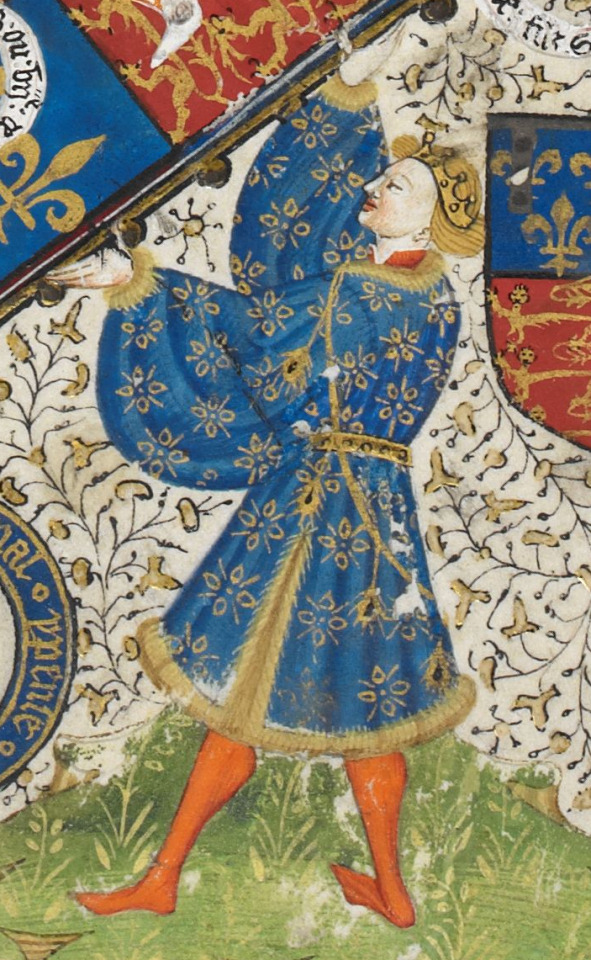
There are a lot of myths about what the brothers looked like that were mostly created by historical fiction - including that Edward and George were tall and strong while Richard was small (in fact, I don't think we have any contemporary evidence of what George looked like), or that Edward or maybe George too were blond while Richard was dark (both Edward and Richard seemed to have medium brown hair) or that Edward and Richard looked nothing alike. I actually think there is quite a resemblance between the two brothers mostly in chin and face shape, which probably would've been obvious before Edward had gained weight and his face shape got much fuller.
41 notes
·
View notes
Text
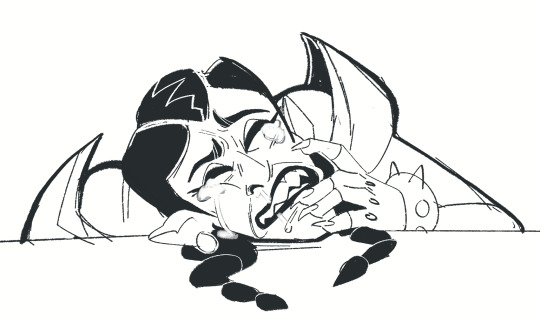

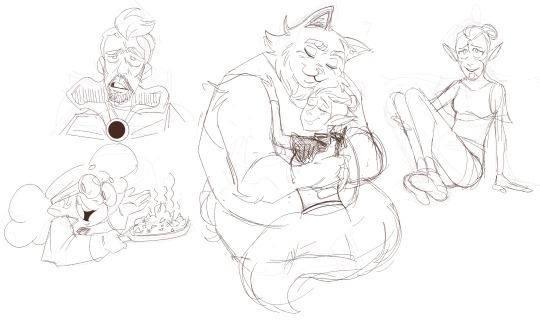
A bunch of sketches! Clementine had a bad time when we went back to Vaysha's house. And some Team Null randoms. Hexis is a great cook.
#Original: DNDorks#Campaign: Villas and Vampires#Campaign: Team Null#Char: Clementine the Twilight Sentinel#Char: Mira Sedge#Char: Edmund MacHalfred#Char: Hexis Ronklebottom#Char: Mortimer Meatloaf Montgomery#Char: Lux#Ship: ClementinexMira#Ship: MeatloafxLux
2 notes
·
View notes